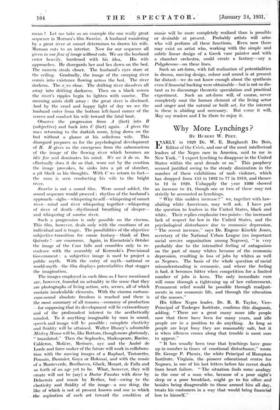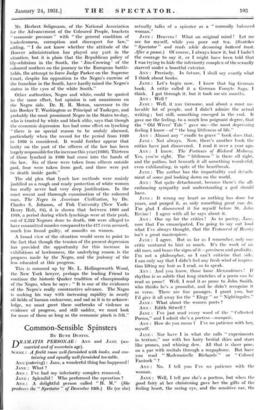Why More Lynchings ?
BY HUBERT W. PEET.
EARLY in 1929. Dr. W. E. Burghardt Du Bois, Editor of the Crisis, and one of the most intellectual leaders of the Negro race in America, said to me in New York, " I expect lynching to disappear in the United States within the next decade or so." This prophecy seemed justified owing to the steady diminution in the number of these exhibitions of mob violence, which has dropped from 155 in 1892 to 77 in 1919, and thence to 12 in 1929. Unhappily the year 1930 showed an increase to 24, though one or two of these may riot strictly be accounted as lynchings.
" Why this sudden increase ?" we, together with law- abiding white Americans, may well ask. I have put the question to leaders in the United States, black and white. Their replies emphasize two points—the increased lack of respect for law in the United States, and the psychological disturbance due to economic depression. " The recent increase," says Dr. Eugene Kinckle Jones, secretary of the National Urban League (an important social service organization among Negroes), " is very probably due to the intensified feeling of antagonism on the part of many whites because of the economic depresSion, resulting in loss of jobs by whites as well as Negroes. The basis of the whole question of racial misunderstanding is economic, and where the feeling is bad, it becomes bitter when competition for a limited number of jobs is keen. The only immediate cure will come through a tightening up of law enforcement. Permanent relief would be possible through readjust- ments in our economic life, and through the education of the masses." - His fellow Negro leader, Dr: R. R. Taylor, Vice- Principal of Tuskegee Institute, confirms this diagnosis, adding, " There are a great many more idle people now that there have been for many years, and idle people are in a position to do anything. As long as people are kept busy they are reasonably safe, but it is when idleness comes along that trouble is most sure to appear."
" It has usually been true that lynchings have gone up in number in times of emotional disturbance," wrote Dr. George P: Phenix, the white Principal of Hampton Virginia,• the - pioneer educational centre for Negroes, in one of his last letters before his recent death from heart failure. " The situation finds some analogy in the case of a man who, because of -a poor night's sleep or • a poor breakfast, might go to his office and besides being disagreeable to those around him all day, treats his customers in a way that would bring financial loss to himself." Mr. Herbert Seligmann, of the National Association for the Advancement of the Coloured People, brackets " economic pressure " with " the general condition of Icaderlessness, corruption and disrespect for law," adding, " I do not know whether the attitude of the Hoover administration has played any part in the situation, but it is plain that the Republican policy of lily-whiteism in the South, the ' Jim-Crowing ' of the coloured mothers on the journey to the European battle- fields, the attempt to force Judge Parker on the Supreme Court, despite his opposition to the Negro's exercise of the franchise in the South, have hardly raised the Negro's status in the eyes of the white South."
Other authorities, Negro and white, could be quoted to the same effect, but opinion is not unanimous on the Negro side. Dr. R. R. Moton, successor to the late Booker T. Washington as Principal of Tuskegee, and probably the most prominent Negro in the States to-day, who is trusted by white and black alike, says that though the economic depression has had some effect on lynching " there is no special reason to be unduly alarmed, particularly when the record for the period from 1920 to 1930 is considered. It would further appear that laxity on the part of the officers of the law has been largely responsible for the increase this year (1930). Thirteen of those lynched in 1930 had come into the hands of the law. Six of these were taken from officers outside gaol, four were taken from gaol, and three were put to death inside gaols."
The old plea that lynch law methods were mainly justified as a rough and ready protection of white women has really never had very deep justification. In the most recent and thorough examination of the coloured man, The Negro in American Civilization, by Dr. Charles S. Johnson, of Fisk University (New York: Henry Holt, $4), it is shown that between 1889 and 1918, a period during which lynchings were at their peak, out of 2,522 Negroes done to death, 900 were alleged to have committed murder compared to the 477 even accused, much less found guilty, of assaults on women.
A broad view of the situation would seem to point to the fact that though the tension of the present depression has provided the opportunity for this increase in exhibitions of lawlessness, the underlying reason is the progress made by the Negro, and the jealousy of the less educated at this progress.
This is summed up by Mr. L. Hollingsworth Wood, the New York lawyer, perhaps the leading Friend to continue the historic Quaker tradition of championship of the Negro, when he says : " It is one of the evidences of the Negro's really constructive, advance. The Negro is making his way with increasing rapidity in nearly all fields of human endeavour, and sad as it is to acknow- ledge, . we must greet 'these outbreaks of violence as evidence of progress, and still ' sadder, we must look for more of them so long as the economic pinch is felt."







































 Previous page
Previous page